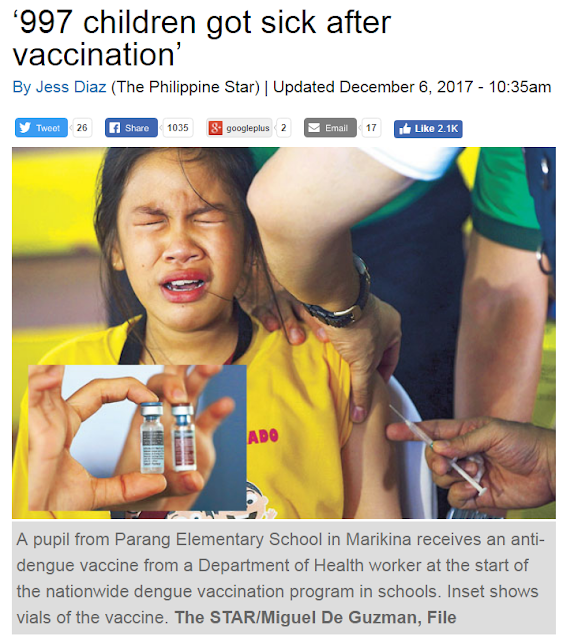"It's Happened. We Have a Vaccine that Enhances Dengue" - We Should Listen to Experts
“It's clear as the nose on my face: Vaccine recipients less than 5 years old had five to seven times more rates of hospitalizations for severe dengue virus than placebo controls."
These were the words of the one of the world's leading experts on dengue and vaccines, Dr. Scott Halstead. He even added the following remarks after raising serious concerns regarding the mass dengue vaccination program launched in the Philippines:
These were the words of the one of the world's leading experts on dengue and vaccines, Dr. Scott Halstead. He even added the following remarks after raising serious concerns regarding the mass dengue vaccination program launched in the Philippines:
"Seronegatives are going to be sensitized to dengue virus for the rest of their lives, and it's not going to stop at hospitalizations. Someone is going to die. Once that happens there's enough lawyers that are going to do something about it."
As noted in two previous posts on this blog, the warning signs were already there during the summer of 2015, long before the Philippines president met with executives at Sanofi (the maker of Dengvaxia) on December 2015. The fear has always been there and results laid out that summer in fact proved to Halstead that his hypothesis was correct. The hypothesis is that vaccines can raise a body's sensitivity to a disease. This is called antibody-dependent enhancement or ADE. Dengue is particularly a good candidate for this hypothesis because of its widely known more severe second infection. The dengue epidemics in Cuba served as a good real life lesson on this disease, which also indicated that "the longer interval [between infection with different dengue strains], the more severe the disease", according to Halstead. Thus, the full ramification of the ill-advised mass vaccinations of children in the Philippines may not be realized until a few years. And with a report today from the Philippine Star, initial results already do not look good. |
| Above copied from the Philippine Star |
Facing a crisis, it is clear that a suitable response is required. Of course, it goes without saying that the government must monitor the health of the children that were vaccinated. Dengue, like any disease, requires care. Death often happens when complications arise like hemorrhage and high fever. Dengue is transmitted through mosquitoes so in places where mass vaccinations happened, measures should be taken to reduce the mosquito population and people should take extra steps to prevent mosquito bites. Aedes aegypti, the mosquito that carries dengue, bites during the day (hours after sunrise and hours before sunset).
With regard to national leaders and policy makers, there are very important lessons to be learned. "Do no harm" is never a rule one can ignore. One cannot use the excuse of desperate circumstances. After all, things can always get worse. Simply because there seems to be an increase in hospitalization due to dengue, one is still and should never be justified to take unproven measures.
The Aquino administration bears full responsibility for the Dengvaxia fiasco. There is indeed plenty of opportunity to learn more about this unproven vaccine yet the Aquino administration even with huge financial challenges has managed to embark on a mass vaccination program in a short period of time. It is reckless and the funding itself seems unconstitutional.
This blog has followed how the Aquino administration instituted reforms in basic education and one can not fail to see a striking similarity. The haste, the recklessness, and the complete disregard of evidence-based research are all present. Not blaming how these leaders arrive irresponsibly at policies is really tantamount to not learning important lessons from these huge disasters that are of our own making. In these cases, placing blame is important. Otherwise, we will not change and will keep making the same mistakes over and over again.
With regard to national leaders and policy makers, there are very important lessons to be learned. "Do no harm" is never a rule one can ignore. One cannot use the excuse of desperate circumstances. After all, things can always get worse. Simply because there seems to be an increase in hospitalization due to dengue, one is still and should never be justified to take unproven measures.
The Aquino administration bears full responsibility for the Dengvaxia fiasco. There is indeed plenty of opportunity to learn more about this unproven vaccine yet the Aquino administration even with huge financial challenges has managed to embark on a mass vaccination program in a short period of time. It is reckless and the funding itself seems unconstitutional.
This blog has followed how the Aquino administration instituted reforms in basic education and one can not fail to see a striking similarity. The haste, the recklessness, and the complete disregard of evidence-based research are all present. Not blaming how these leaders arrive irresponsibly at policies is really tantamount to not learning important lessons from these huge disasters that are of our own making. In these cases, placing blame is important. Otherwise, we will not change and will keep making the same mistakes over and over again.
Comments
Post a Comment